pdf [5.3MB] - Department of Families, Housing, Community Services
pdf [5.3MB] - Department of Families, Housing, Community Services
pdf [5.3MB] - Department of Families, Housing, Community Services
Create successful ePaper yourself
Turn your PDF publications into a flip-book with our unique Google optimized e-Paper software.
This section on early childhood interventions reviews broad studies on the overall reportedeffects <strong>of</strong> early childhood education (ECE) programs, rather than looking at studies onspecific programs. The target groups for ECE programs can vary based on whether aprogram is universal, aimed at educational services indiscriminately within a jurisdiction, ortargeted in terms <strong>of</strong> a specific demographic group.Research on efficacyThe majority <strong>of</strong> past research and literature focuses on targeted programs. It is important tonote that the impact <strong>of</strong> ECE programs depends on the structural quality <strong>of</strong> programs. Thisincludes factors such as, for example, teacher qualifications, staff-child ratios and groupsizes. ECE programs have been associated with a number <strong>of</strong> positive outcomes including:increased adult earnings;improved academic outcomes;lower crime ratesreduced antisocial behaviour;improved health outcomes;reduced reliance on welfare;spill-over to peers and the community; andintergenerational spill-over.Research in the US by Isaacs (2006), for example, found that enrolling children into ECEprograms improves their outcomes in primary school (Isaacs, 2006). These improvementsinclude enhanced test results, lower utilisation <strong>of</strong> special education as well as reductions inrepeating year levels. Furthermore, participants had higher rates <strong>of</strong> employment, greaterearnings and lower levels <strong>of</strong> criminal activity into adulthood.Literature ReviewMitchell et al (2008) attempted to synthesise research on the impact <strong>of</strong> ECE programs forchildren and families – addressing questions <strong>of</strong> the short and long term developmental,educational, social and economic outcomes from participation in programs, differentoutcomes for different population groups and contexts. The review included 117 studiesreported after 1995, which met certain selection criteria in terms <strong>of</strong> research methods,analysis and findings. Longitudinal studies on interventions aimed at disadvantaged childrenand longitudinal studies <strong>of</strong> everyday childhood experience were reviewed.This literature review had the following findings in regards to ECE programs outcomes forchildren (Mitchell et al, 2008).Cognitive outcomes: International and New Zealand evidence reported that ECEparticipation was positively associated with gains in mathematics, literacy, schoolachievement, intelligence tests, and school readiness, reduced grade retention andreduced special education placement. It was reported that medium to large effect sizeswere found for outcome measures in the US intervention studies targeting childrenfrom low-income families, and combining programs with parental support/education(effect sizes <strong>of</strong> 0.32 to 0.81 were reported in the short term for mathematics and 0.19 to0.44 in the long term; effect sizes <strong>of</strong> 0.34 to 0.89 were reported for reading in the shortterm and 0.17 to 0.44 in the long term.) Everyday ECE experiences reported small tomedium effect sizes (0.1 to 0.23 for maths in the short term; 0.02 to 0.23 for reading inthe short term).75


![pdf [5.3MB] - Department of Families, Housing, Community Services](https://img.yumpu.com/43360016/91/500x640/pdf-53mb-department-of-families-housing-community-services.jpg)

![pdf [107kB] - Department of Families, Housing, Community Services](https://img.yumpu.com/51272499/1/190x245/pdf-107kb-department-of-families-housing-community-services.jpg?quality=85)
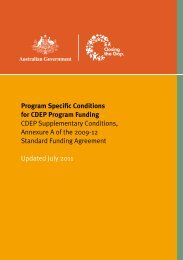



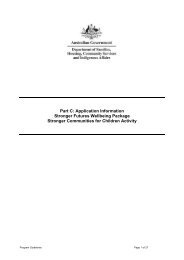
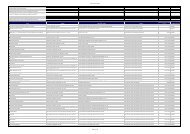
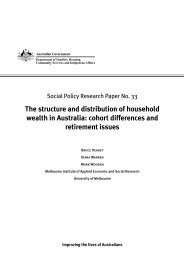
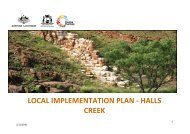


![Land Claim - pdf [278kB] - Department of Families, Housing ...](https://img.yumpu.com/47002639/1/184x260/land-claim-pdf-278kb-department-of-families-housing-.jpg?quality=85)

![Borroloola Land Claim - pdf [299kB] - Department of Families ...](https://img.yumpu.com/46103973/1/184x260/borroloola-land-claim-pdf-299kb-department-of-families-.jpg?quality=85)